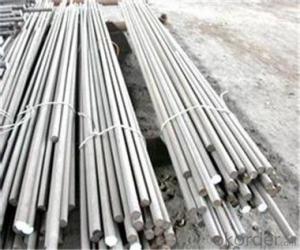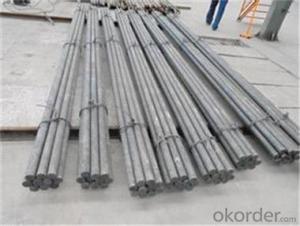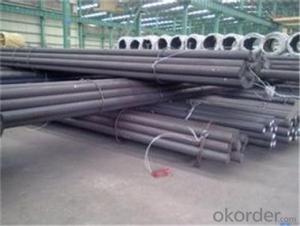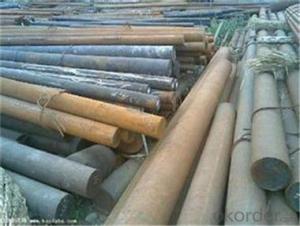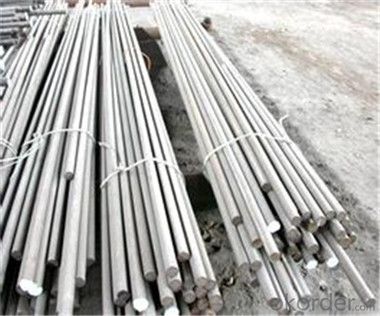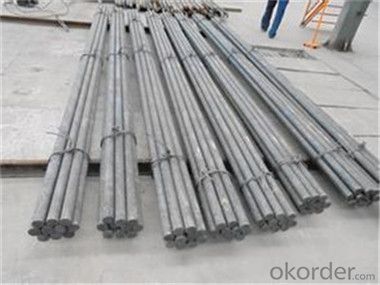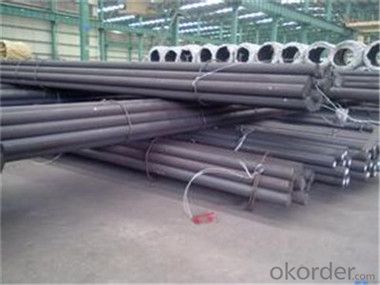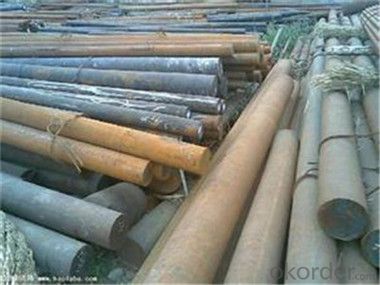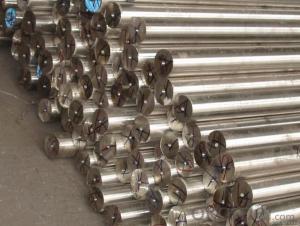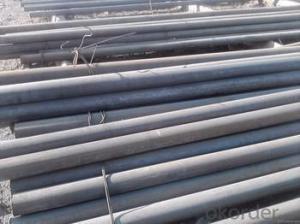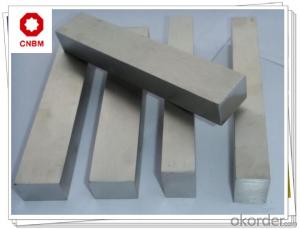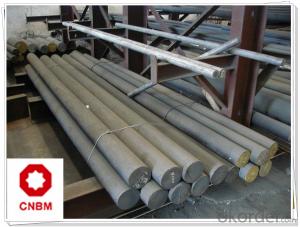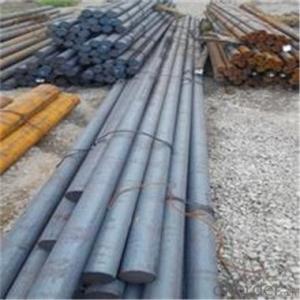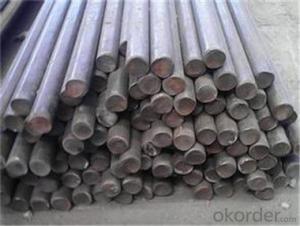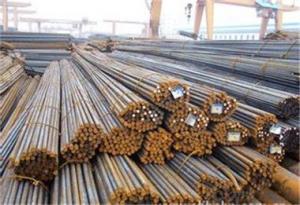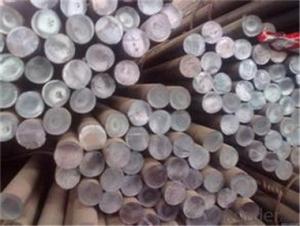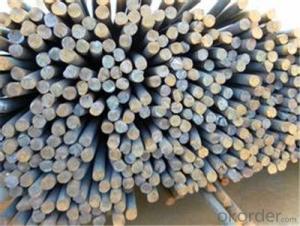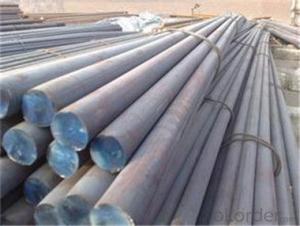Round Bar Reliable Manufacturer with Standard High Quality
- Loading Port:
- Tianjin
- Payment Terms:
- TT OR LC
- Min Order Qty:
- 77 m.t.
- Supply Capability:
- 2000000 m.t./month
OKorder Service Pledge
OKorder Financial Service
You Might Also Like
Description of steel round bar:
Process:Hot rolled,cold drawn,forged,wrought
Festures of steel round bar:
Inspection: 100% UT test, mill test certificate, third party inspection such as SGS,BV etc.
Packing: In bundle, tied by steel straps, covered with protecting film. Use wooden box.
Specifications of steel round bar:
Description | steel round bar | |
Material | ASTM /AISI | 1005,1006,1008,1010,1015,1020,1025,1030,1035, 1040,1045,1050,1055,1060,1065,1070,1080,1084 |
DIN | Ck10,Ck15,Ck22,Ck25,Ck30,Ck35,Ck40,Ck45,Ck50, 30Mn4,40Mn4,1.7225,1.7220,1.7218,1.7016,1.6523 | |
Standard | GB/T799,ASTM A29,A36,A108,A321,A575,BS970,DIN1652,JIS G4051 | |
cross section | Round Other shape:square,hexagonal,flat,angle,rectangular | |
Surface | Black, galvanized,grinded,varnished,bare | |
Specifications | Round bar | Diameter: 12mm~650mm |
Angle bar | Size: 3mm*20mm*20mm~12mm*800mm*800mm | |
Square/ bar | Size: 4mm*4mm~100mm*100mm | |
Flat bar | Thickness: 2mm~100mm | |
Width:10mm~500mm | ||
Hexagonal | Size: 4mm~800mm | |
Length | Standard 6m,9m,12m or as required. | |
Trade terms | Payment terms | T/T,L/C,Western Union,negotiable etc. |
Price terms | FOB,CIF,CFR,EXW etc. | |
Applications | Steel round bar is widely used for all general fabrication and repairs in industrial maintenance, agricultural implements, transportation equipment, ornamental work frame work, braces, supports, shafts,axels,etc. Hot rolled Steel round bars have a slightly grain textured finish. | |
Images of steel round bar:
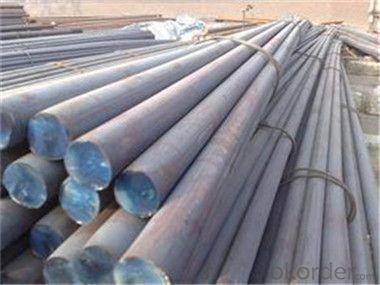
FAQ:
1. What is your package?
Packing situation: standard seaworthy packing or as customer required.
2. How long is the lead time?
Delivery time: 45 days after order confirmed.
3. What payment term do you accept?
Payment: T/T or L/C at sight.
- Q: What are the different types of steel round bar alloys used in the automotive industry?
- In the automotive industry, there are several types of steel round bar alloys used due to their various properties and applications. 1. Carbon Steel: Carbon steel round bars are widely used as they offer good strength and toughness. They are used in various automotive components such as axles, crankshafts, and gears. 2. Alloy Steel: Alloy steel round bars contain additional alloying elements such as chromium, nickel, or molybdenum. These alloys enhance the mechanical properties of the steel, making it stronger and more durable. Alloy steel round bars are commonly used in automotive applications like suspension components, drive shafts, and steering components. 3. Stainless Steel: Stainless steel round bars are highly resistant to corrosion, making them suitable for automotive applications that require durability in harsh environments. They are commonly used in exhaust systems, fuel tanks, and body parts. 4. Tool Steel: Tool steel round bars have high hardness, wear resistance, and toughness. They are mainly used in the production of automotive tools and dies, such as punches, dies, and cutting tools. 5. Bearing Steel: Bearing steel round bars are specifically designed to provide excellent wear resistance and high load-carrying capacity in automotive bearings. These bars have a high level of hardness and are heat-treated to ensure optimal performance. 6. Spring Steel: Spring steel round bars are used in automotive suspension systems and other applications that require excellent elasticity and fatigue resistance. These bars can withstand repeated stress and maintain their shape, making them ideal for automotive springs and stabilizer bars. It's important to note that the specific choice of steel alloy depends on the desired properties, performance requirements, and cost considerations for each automotive component.
- Q: Can steel round bars be used for making agricultural equipment or machinery?
- Yes, steel round bars can be used for making agricultural equipment or machinery. Steel is a versatile and durable material that is commonly used in the manufacturing of various agricultural equipment and machinery. Steel round bars, in particular, are often utilized for making components such as shafts, axles, and rods that are crucial for the functioning of agricultural machinery. These round bars provide strength, stability, and resistance to wear and tear, making them suitable for heavy-duty applications in the agricultural industry. Additionally, steel is also corrosion-resistant, which is especially important in agriculture where equipment is exposed to harsh environmental conditions. Overall, steel round bars are a reliable choice for constructing agricultural equipment or machinery due to their mechanical properties and ability to withstand the demanding conditions of agricultural operations.
- Q: Can steel round bars be used for shafting applications?
- Yes, steel round bars can be used for shafting applications. Steel round bars are commonly used in various industries for shafting purposes due to their high strength, durability, and ability to withstand rotational forces. They provide excellent stability and support for transmitting power or motion in a wide range of applications, such as machinery, automotive, construction, and manufacturing.
- Q: What are the advantages of using nickel-molybdenum-vanadium alloy steel round bars?
- There are several advantages of using nickel-molybdenum-vanadium alloy steel round bars, including: 1. High strength and durability: Nickel-molybdenum-vanadium alloy steel round bars offer excellent strength and durability, making them suitable for applications that require a high level of structural integrity. This alloy steel is known for its ability to withstand heavy loads and resist deformation, making it ideal for use in industries such as construction, automotive, and aerospace. 2. Corrosion resistance: Another advantage of using nickel-molybdenum-vanadium alloy steel round bars is their excellent resistance to corrosion. The addition of nickel and vanadium to the alloy enhances its ability to resist oxidation and corrosion, even in harsh environmental conditions. This makes it a preferred choice for applications where exposure to moisture, chemicals, or corrosive substances is expected. 3. Heat resistance: Nickel-molybdenum-vanadium alloy steel round bars have a high heat resistance, making them suitable for applications that involve high temperatures. The presence of molybdenum in the alloy increases its resistance to thermal stress, ensuring that it remains structurally stable even at elevated temperatures. This makes it ideal for use in industries such as oil and gas, power generation, and heat exchangers. 4. Versatility: The versatility of nickel-molybdenum-vanadium alloy steel round bars is another advantage. This alloy can be easily forged, machined, and welded, allowing for a wide range of manufacturing processes. Its versatility makes it a preferred choice for applications that require complex shapes and designs, such as shafts, gears, and valves. 5. Cost-effective: Despite its numerous advantages, nickel-molybdenum-vanadium alloy steel round bars are relatively cost-effective compared to other high-performance alloys. Its excellent combination of properties makes it a cost-efficient option for various industries, as it offers a longer lifespan, reduced maintenance requirements, and improved performance, ultimately resulting in cost savings over time. In conclusion, the advantages of using nickel-molybdenum-vanadium alloy steel round bars include high strength and durability, corrosion resistance, heat resistance, versatility, and cost-effectiveness. These properties make it a preferred choice for a wide range of applications in various industries.
- Q: How to distinguish a round bar from forging? Cold drawing? Hot rolling?
- The main differences are in mechanical properties. Forged round steel is used in the processing of some special performance requirements. Round steel three processing methods are more common, should be very wide surface.
- Q: Can steel round bars be used for making drill bits?
- No, steel round bars cannot be used for making drill bits. Drill bits require specific materials and manufacturing processes to ensure their durability and effectiveness. Drill bits are typically made from high-speed steel (HSS), cobalt steel, or carbide. These materials are chosen for their hardness, heat resistance, and ability to withstand the high forces and temperatures generated during drilling. Steel round bars, on the other hand, are not specifically designed or manufactured to meet the requirements of drill bits. Using steel round bars for making drill bits would result in inferior performance, increased wear, and potential breakage during drilling operations. It is important to use drill bits that are specifically designed and manufactured for the purpose to ensure efficient and safe drilling operations.
- Q: What are the factors to consider when selecting a steel round bar for a specific application?
- When choosing a steel round bar for a particular application, there are several key factors that need to be taken into account. Firstly, the material grade of the steel round bar is of utmost importance. Different grades of steel have different properties, such as strength, hardness, and resistance to corrosion. It is crucial to select a material grade that is suitable for the specific requirements of the application. Secondly, the mechanical properties of the steel round bar, such as tensile strength, yield strength, and elongation, need to be carefully evaluated. These properties determine how well the bar can withstand forces and deformations under load. It is important to choose a steel round bar with mechanical properties that are compatible with the demands of the application. The size and dimensions of the steel round bar also play a critical role. This includes considering the diameter, length, and tolerance requirements. The dimensions should be chosen based on the structural needs of the application and the desired load-bearing capacity of the bar. The surface finish of the steel round bar is significant, particularly in applications where aesthetics or contact with other components are important. Factors such as smoothness, roughness, and the presence of coatings or treatments should be taken into account. Depending on the environment in which the application will be used, it is crucial to select a steel round bar with adequate corrosion resistance. Factors such as exposure to moisture, chemicals, or extreme temperatures can impact the bar's performance and longevity. Options like stainless steel or corrosion-resistant coatings can be considered to enhance the bar's resistance to corrosion. If the steel round bar needs to be machined or fabricated into a specific shape, its machinability must be considered. Some steel grades are easier to machine than others and may require different tools or techniques. It is important to choose a bar with a machinability that aligns with the desired manufacturing processes. Lastly, the cost of the steel round bar should not be overlooked. Different material grades and specifications come with varying price points. It is important to strike a balance between the required properties and performance of the bar and the budget constraints of the project. In conclusion, selecting a steel round bar for a specific application necessitates careful consideration of the material grade, mechanical properties, size, surface finish, corrosion resistance, machinability, and cost. By taking these factors into account, one can ensure that the chosen steel round bar will meet the requirements of the application and deliver optimal performance.
- Q: What is the difference between a smooth and a deformed steel round bar?
- A smooth steel round bar is characterized by its consistently even surface, free from any visible imperfections or deformities. It is typically produced using the hot rolling technique, which involves heating a steel billet and passing it through a series of rolling mills to achieve the desired shape and surface finish. Smooth steel round bars are commonly employed in applications where aesthetics and surface quality are of utmost importance, such as architectural designs or decorative metalwork. Contrarily, a deformed steel round bar possesses intentional deformations or patterns on its surface. These deformations can take various forms, including ridges, ribs, or indentations. The purpose of incorporating deformations on the surface of a steel round bar is to enhance its ability to bond with concrete or other materials. The irregular surface of a deformed bar provides increased friction and better adhesion, thereby improving the structural integrity of reinforced concrete structures. Deformed steel round bars find primary use in construction projects, particularly in reinforced concrete structures like columns, beams, and slabs. The deformations on the bar's surface serve to prevent slippage between the steel and concrete, ensuring a stronger bond and enhancing the overall stability and durability of the structure. To summarize, the key distinction between a smooth and a deformed steel round bar lies in their surface characteristics and intended applications. Smooth bars possess a uniform and smooth surface, making them suitable for applications that prioritize aesthetics and surface quality. Deformed bars, on the other hand, possess intentional deformations to enhance bonding with concrete, making them well-suited for construction projects that require reinforced concrete structures.
- Q: Are steel round bars suitable for electrical conductivity?
- Steel round bars are not typically known for their electrical conductivity. Steel is a good conductor of heat but has relatively poor electrical conductivity compared to other metals such as copper or aluminum. This is because steel is primarily composed of iron, which is a poor conductor of electricity. However, the electrical conductivity of steel can be improved by adding certain alloying elements such as chromium or nickel. These alloying elements can enhance the electrical conductivity of steel, making it more suitable for specific applications where electrical conductivity is required. Nonetheless, if high electrical conductivity is a critical requirement, other materials like copper or aluminum are usually preferred over steel round bars.
- Q: What is the difference between a cold finished and a turned steel round bar?
- A cold finished steel round bar is processed through cold drawing or cold rolling processes, resulting in a smoother and more precise surface finish. On the other hand, a turned steel round bar is machined on a lathe, which removes material to achieve the desired dimensions and surface finish. Overall, the difference lies in the manufacturing process and the resulting surface finish of the two types of steel round bars.
Send your message to us
Round Bar Reliable Manufacturer with Standard High Quality
- Loading Port:
- Tianjin
- Payment Terms:
- TT OR LC
- Min Order Qty:
- 77 m.t.
- Supply Capability:
- 2000000 m.t./month
OKorder Service Pledge
OKorder Financial Service
Similar products
Hot products
Hot Searches
Related keywords
